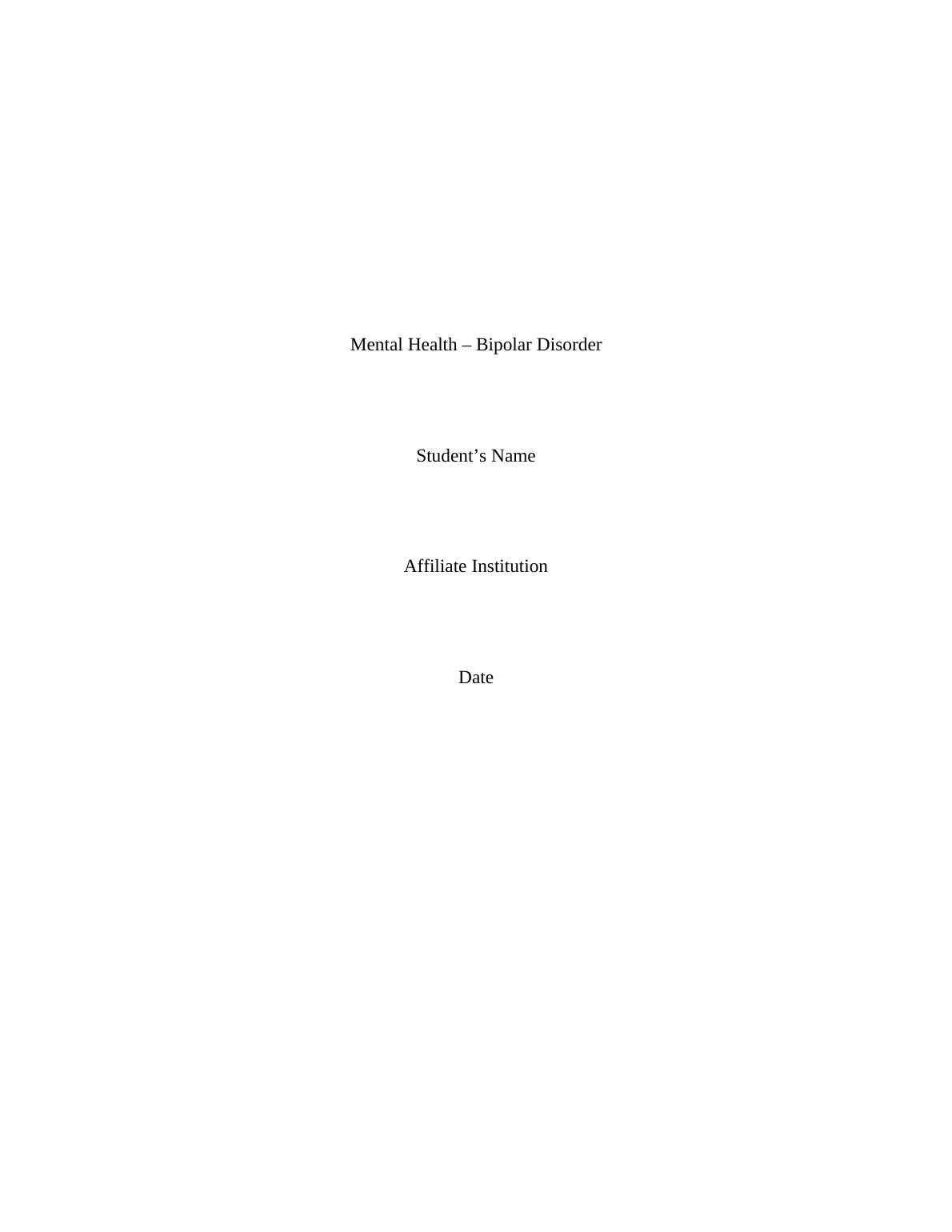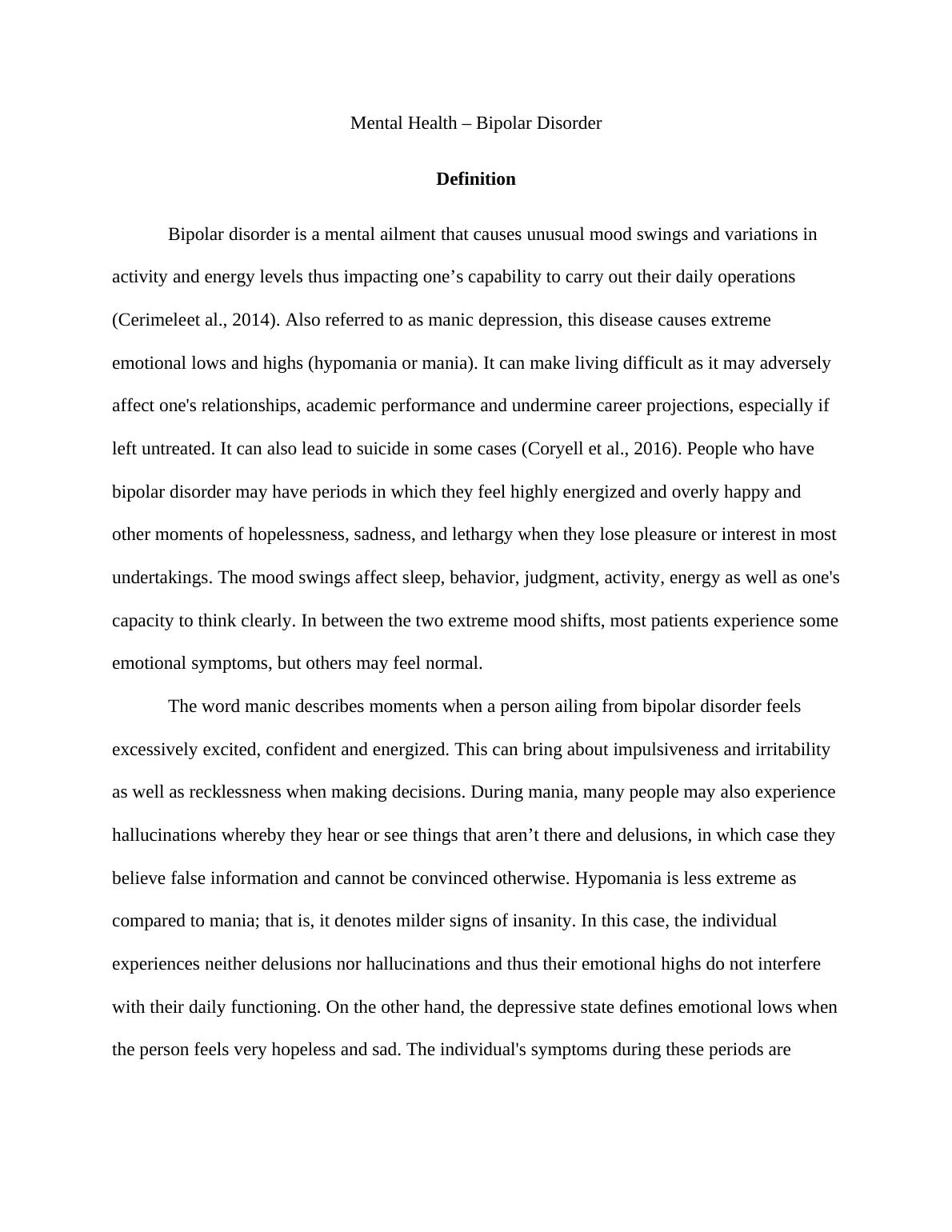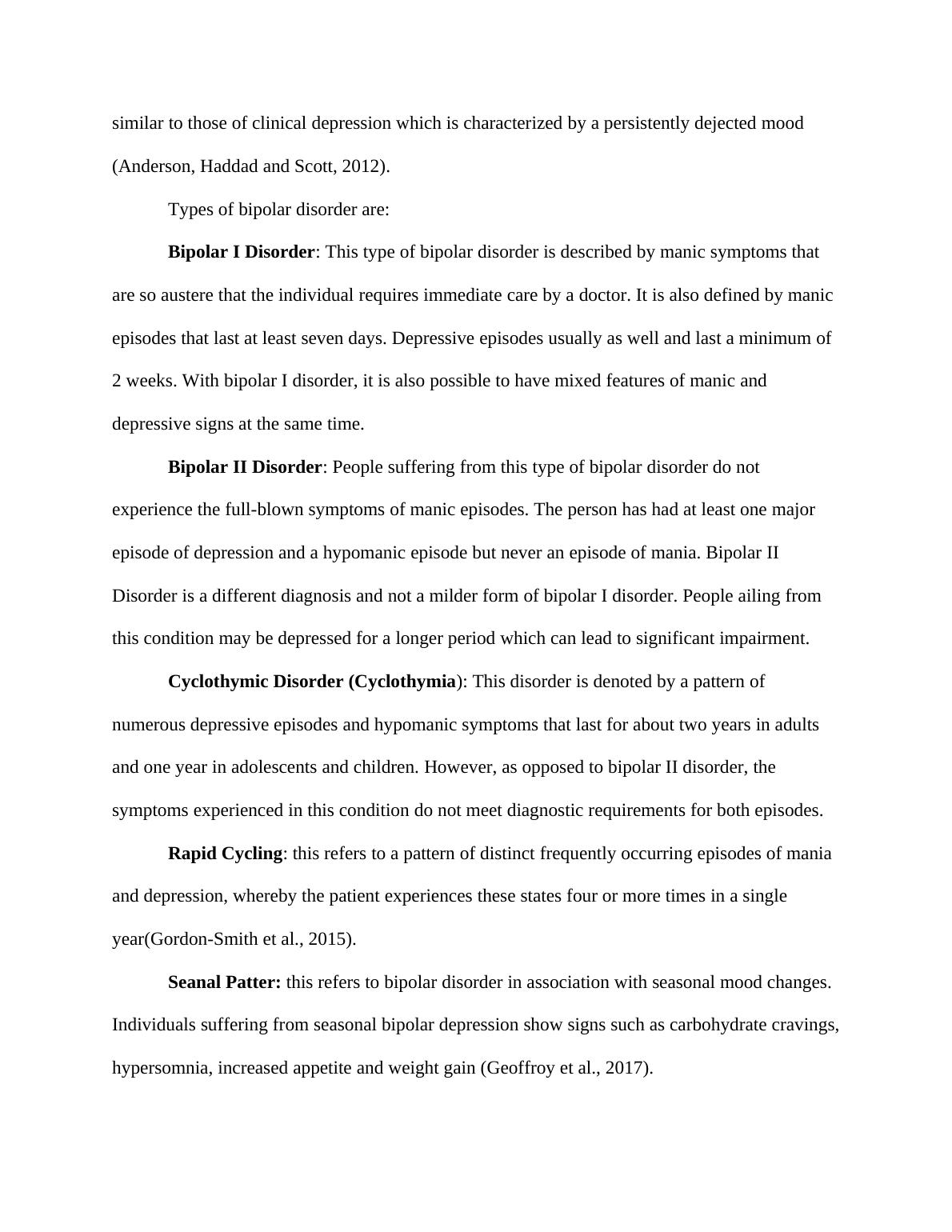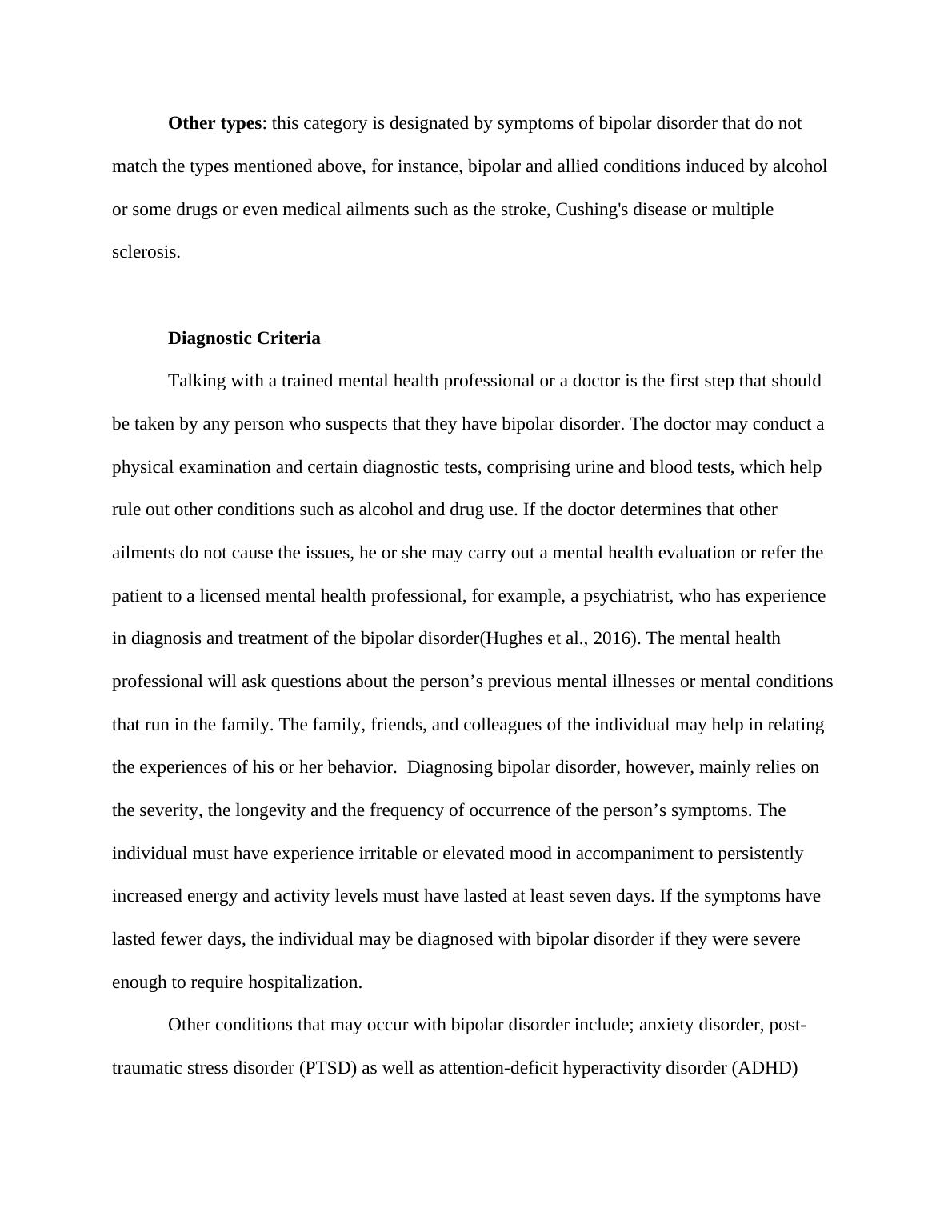Mental Health - Bipolar Disorder
Added on 2022-12-15
17 Pages4429 Words63 Views
Mental Health – Bipolar Disorder
Student’s Name
Affiliate Institution
Date
Student’s Name
Affiliate Institution
Date

Mental Health – Bipolar Disorder
Definition
Bipolar disorder is a mental ailment that causes unusual mood swings and variations in
activity and energy levels thus impacting one’s capability to carry out their daily operations
(Cerimeleet al., 2014). Also referred to as manic depression, this disease causes extreme
emotional lows and highs (hypomania or mania). It can make living difficult as it may adversely
affect one's relationships, academic performance and undermine career projections, especially if
left untreated. It can also lead to suicide in some cases (Coryell et al., 2016). People who have
bipolar disorder may have periods in which they feel highly energized and overly happy and
other moments of hopelessness, sadness, and lethargy when they lose pleasure or interest in most
undertakings. The mood swings affect sleep, behavior, judgment, activity, energy as well as one's
capacity to think clearly. In between the two extreme mood shifts, most patients experience some
emotional symptoms, but others may feel normal.
The word manic describes moments when a person ailing from bipolar disorder feels
excessively excited, confident and energized. This can bring about impulsiveness and irritability
as well as recklessness when making decisions. During mania, many people may also experience
hallucinations whereby they hear or see things that aren’t there and delusions, in which case they
believe false information and cannot be convinced otherwise. Hypomania is less extreme as
compared to mania; that is, it denotes milder signs of insanity. In this case, the individual
experiences neither delusions nor hallucinations and thus their emotional highs do not interfere
with their daily functioning. On the other hand, the depressive state defines emotional lows when
the person feels very hopeless and sad. The individual's symptoms during these periods are
Definition
Bipolar disorder is a mental ailment that causes unusual mood swings and variations in
activity and energy levels thus impacting one’s capability to carry out their daily operations
(Cerimeleet al., 2014). Also referred to as manic depression, this disease causes extreme
emotional lows and highs (hypomania or mania). It can make living difficult as it may adversely
affect one's relationships, academic performance and undermine career projections, especially if
left untreated. It can also lead to suicide in some cases (Coryell et al., 2016). People who have
bipolar disorder may have periods in which they feel highly energized and overly happy and
other moments of hopelessness, sadness, and lethargy when they lose pleasure or interest in most
undertakings. The mood swings affect sleep, behavior, judgment, activity, energy as well as one's
capacity to think clearly. In between the two extreme mood shifts, most patients experience some
emotional symptoms, but others may feel normal.
The word manic describes moments when a person ailing from bipolar disorder feels
excessively excited, confident and energized. This can bring about impulsiveness and irritability
as well as recklessness when making decisions. During mania, many people may also experience
hallucinations whereby they hear or see things that aren’t there and delusions, in which case they
believe false information and cannot be convinced otherwise. Hypomania is less extreme as
compared to mania; that is, it denotes milder signs of insanity. In this case, the individual
experiences neither delusions nor hallucinations and thus their emotional highs do not interfere
with their daily functioning. On the other hand, the depressive state defines emotional lows when
the person feels very hopeless and sad. The individual's symptoms during these periods are

similar to those of clinical depression which is characterized by a persistently dejected mood
(Anderson, Haddad and Scott, 2012).
Types of bipolar disorder are:
Bipolar I Disorder: This type of bipolar disorder is described by manic symptoms that
are so austere that the individual requires immediate care by a doctor. It is also defined by manic
episodes that last at least seven days. Depressive episodes usually as well and last a minimum of
2 weeks. With bipolar I disorder, it is also possible to have mixed features of manic and
depressive signs at the same time.
Bipolar II Disorder: People suffering from this type of bipolar disorder do not
experience the full-blown symptoms of manic episodes. The person has had at least one major
episode of depression and a hypomanic episode but never an episode of mania. Bipolar II
Disorder is a different diagnosis and not a milder form of bipolar I disorder. People ailing from
this condition may be depressed for a longer period which can lead to significant impairment.
Cyclothymic Disorder (Cyclothymia): This disorder is denoted by a pattern of
numerous depressive episodes and hypomanic symptoms that last for about two years in adults
and one year in adolescents and children. However, as opposed to bipolar II disorder, the
symptoms experienced in this condition do not meet diagnostic requirements for both episodes.
Rapid Cycling: this refers to a pattern of distinct frequently occurring episodes of mania
and depression, whereby the patient experiences these states four or more times in a single
year(Gordon-Smith et al., 2015).
Seanal Patter: this refers to bipolar disorder in association with seasonal mood changes.
Individuals suffering from seasonal bipolar depression show signs such as carbohydrate cravings,
hypersomnia, increased appetite and weight gain (Geoffroy et al., 2017).
(Anderson, Haddad and Scott, 2012).
Types of bipolar disorder are:
Bipolar I Disorder: This type of bipolar disorder is described by manic symptoms that
are so austere that the individual requires immediate care by a doctor. It is also defined by manic
episodes that last at least seven days. Depressive episodes usually as well and last a minimum of
2 weeks. With bipolar I disorder, it is also possible to have mixed features of manic and
depressive signs at the same time.
Bipolar II Disorder: People suffering from this type of bipolar disorder do not
experience the full-blown symptoms of manic episodes. The person has had at least one major
episode of depression and a hypomanic episode but never an episode of mania. Bipolar II
Disorder is a different diagnosis and not a milder form of bipolar I disorder. People ailing from
this condition may be depressed for a longer period which can lead to significant impairment.
Cyclothymic Disorder (Cyclothymia): This disorder is denoted by a pattern of
numerous depressive episodes and hypomanic symptoms that last for about two years in adults
and one year in adolescents and children. However, as opposed to bipolar II disorder, the
symptoms experienced in this condition do not meet diagnostic requirements for both episodes.
Rapid Cycling: this refers to a pattern of distinct frequently occurring episodes of mania
and depression, whereby the patient experiences these states four or more times in a single
year(Gordon-Smith et al., 2015).
Seanal Patter: this refers to bipolar disorder in association with seasonal mood changes.
Individuals suffering from seasonal bipolar depression show signs such as carbohydrate cravings,
hypersomnia, increased appetite and weight gain (Geoffroy et al., 2017).

Other types: this category is designated by symptoms of bipolar disorder that do not
match the types mentioned above, for instance, bipolar and allied conditions induced by alcohol
or some drugs or even medical ailments such as the stroke, Cushing's disease or multiple
sclerosis.
Diagnostic Criteria
Talking with a trained mental health professional or a doctor is the first step that should
be taken by any person who suspects that they have bipolar disorder. The doctor may conduct a
physical examination and certain diagnostic tests, comprising urine and blood tests, which help
rule out other conditions such as alcohol and drug use. If the doctor determines that other
ailments do not cause the issues, he or she may carry out a mental health evaluation or refer the
patient to a licensed mental health professional, for example, a psychiatrist, who has experience
in diagnosis and treatment of the bipolar disorder(Hughes et al., 2016). The mental health
professional will ask questions about the person’s previous mental illnesses or mental conditions
that run in the family. The family, friends, and colleagues of the individual may help in relating
the experiences of his or her behavior. Diagnosing bipolar disorder, however, mainly relies on
the severity, the longevity and the frequency of occurrence of the person’s symptoms. The
individual must have experience irritable or elevated mood in accompaniment to persistently
increased energy and activity levels must have lasted at least seven days. If the symptoms have
lasted fewer days, the individual may be diagnosed with bipolar disorder if they were severe
enough to require hospitalization.
Other conditions that may occur with bipolar disorder include; anxiety disorder, post-
traumatic stress disorder (PTSD) as well as attention-deficit hyperactivity disorder (ADHD)
match the types mentioned above, for instance, bipolar and allied conditions induced by alcohol
or some drugs or even medical ailments such as the stroke, Cushing's disease or multiple
sclerosis.
Diagnostic Criteria
Talking with a trained mental health professional or a doctor is the first step that should
be taken by any person who suspects that they have bipolar disorder. The doctor may conduct a
physical examination and certain diagnostic tests, comprising urine and blood tests, which help
rule out other conditions such as alcohol and drug use. If the doctor determines that other
ailments do not cause the issues, he or she may carry out a mental health evaluation or refer the
patient to a licensed mental health professional, for example, a psychiatrist, who has experience
in diagnosis and treatment of the bipolar disorder(Hughes et al., 2016). The mental health
professional will ask questions about the person’s previous mental illnesses or mental conditions
that run in the family. The family, friends, and colleagues of the individual may help in relating
the experiences of his or her behavior. Diagnosing bipolar disorder, however, mainly relies on
the severity, the longevity and the frequency of occurrence of the person’s symptoms. The
individual must have experience irritable or elevated mood in accompaniment to persistently
increased energy and activity levels must have lasted at least seven days. If the symptoms have
lasted fewer days, the individual may be diagnosed with bipolar disorder if they were severe
enough to require hospitalization.
Other conditions that may occur with bipolar disorder include; anxiety disorder, post-
traumatic stress disorder (PTSD) as well as attention-deficit hyperactivity disorder (ADHD)

End of preview
Want to access all the pages? Upload your documents or become a member.
Related Documents
Bipolar Disorder: Symptoms, Risks, and Effective Carelg...
|9
|2529
|34
Psychological Disorders and Treatmentlg...
|8
|1420
|193
Bipolar Disorder: Symptoms, Causes, Diagnosis, Treatment and Preventionlg...
|9
|1576
|172
Effects of Bipolar Disorder on Cognitionlg...
|7
|1995
|78
Bipolar Disorder | Assignment - PSYCH 650lg...
|4
|553
|47
Understanding Bipolar Disorder: Assessment, Intervention, and Collaborative Decision Makinglg...
|16
|4535
|71
